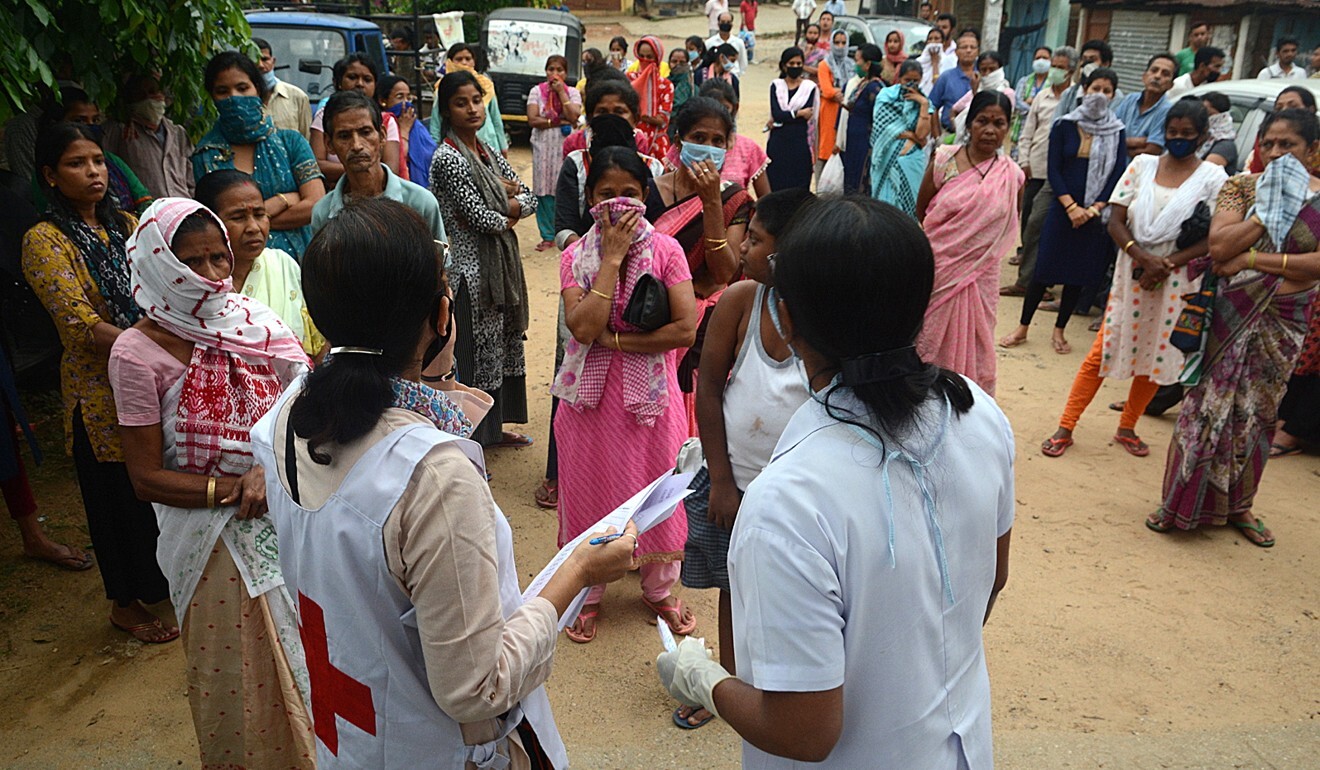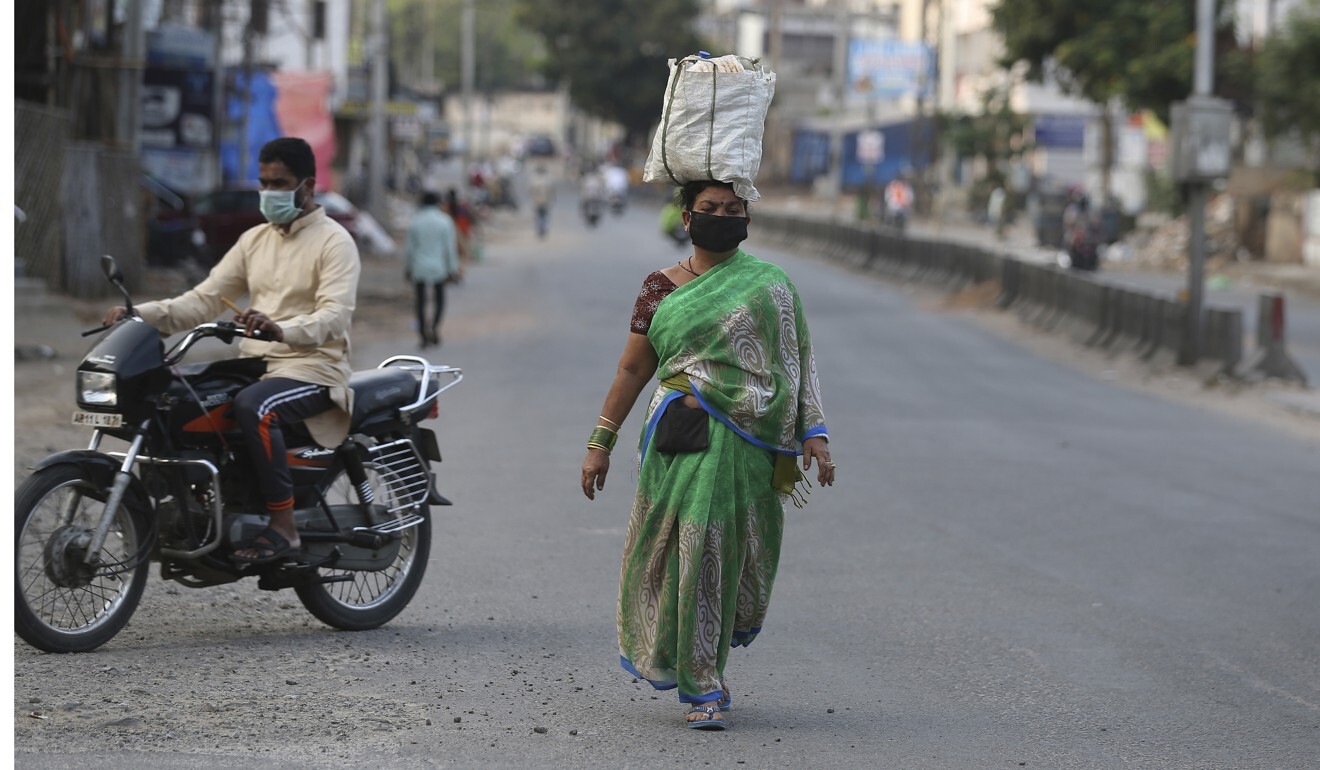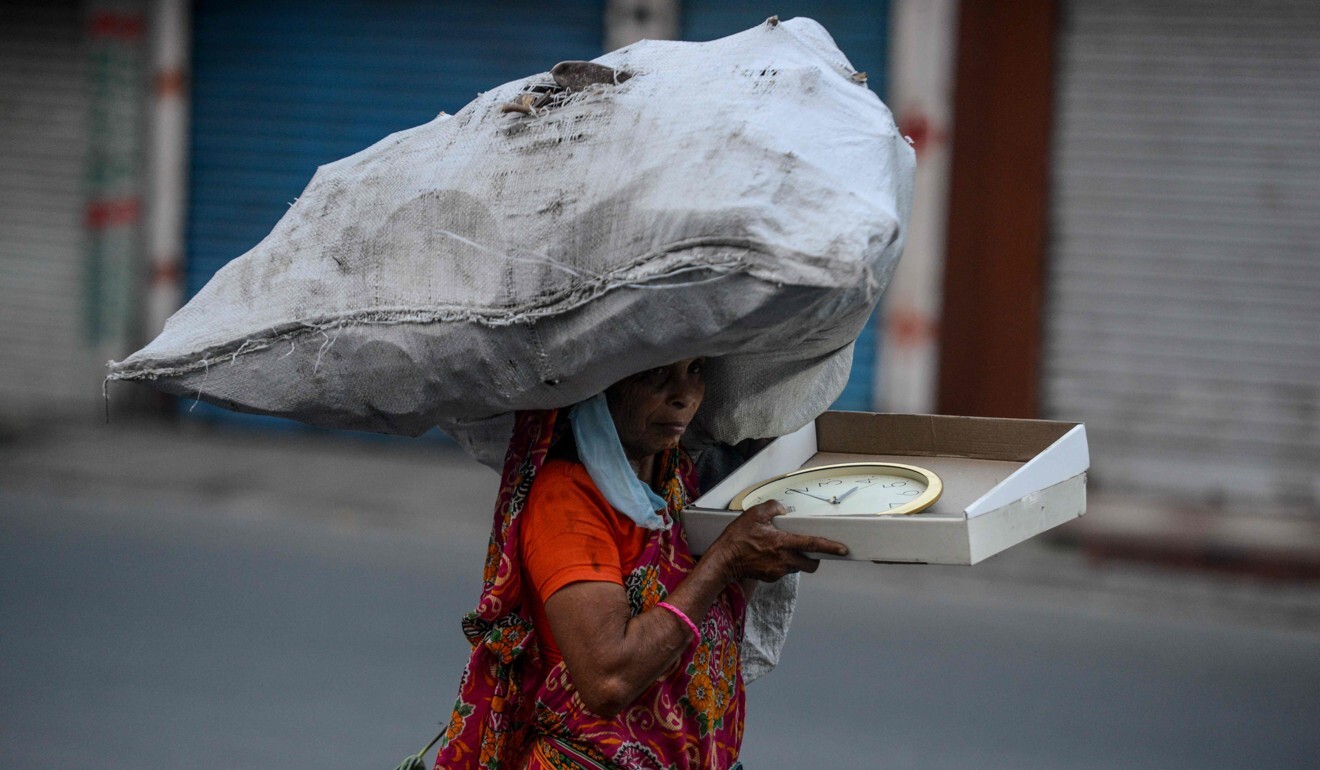- Total isolation forces victims and abusers to share space at home, where men vent their frustrations on the women
Raksha Kumar 12 Apr, 2020

A woman waits to collect free grocery items during India’s nationwide lockdown. India’s National Commission for Women says domestic violence has been increasing since the lockdown started on March 25. Photo: Reuters
Shilpa walked for 12 kilometres until she reached her maternal home on April 1, 2020. Unable to bear her brother-in-law’s beating, she left her marital home in Thane district of the western state of Maharashtra in India and walked towards Belapur where her parents live.Shilpa had been a victim of domestic violence before, but the coronavirus lockdown brought matters to a head.There are two unique factors about India’s lockdown. First, India’s lockdown was absolute.

People wait in queue to collect food packets provided by Indian Red Cross Society in Guwahati during a nationwide lockdown. Photo: EPA-EFE
On March 25, India announced a complete lockdown for 21 days. People who venture out of their homes for anything other than to buy essentials are stopped by the police and questioned at the very least. Reports of police beating or using violent methods to restrict movement are rampant. Unlike in many other countries, people are discouraged from taking walks outside.
Second, since restrictions are rigid, victims and survivors are forced to share a space with abusers all the time. Therefore, complaints of violence have reduced drastically.
“We started five helplines for domestic violence victims after the lockdown was announced and, honestly, we are seeing reduced complaints,” said Anuradha Kapoor, who is director at Swayam, a Kolkata-based non-profit that works on sexual and domestic violence.Coronavirus UpdateGet updates direct to your inboxBy registering, you agree to our T&C and Privacy Policy
According to Indian government figures, at least 30 per cent of all Indian women are or have been victims of domestic violence. Importantly, in 90 per cent of rape cases, the perpetrators are known to the victims.
The National Commission for Women (NCW) has received 69 complaints of domestic violence – twice the usual number – which it said has been increasing since the official lockdown began on March 25.
But there is consensus among all women’s rights activists that cases will increase after the restrictions are lifted. “Because of the lockdown, women are not able to reach out to the police,” said NCW chairwoman Rekha Sharma on April 2.
Besides the police, women have also not been able to reach social workers. Kapoor said there were two major reasons for that.
Coronavirus: India’s elderly taking the brunt of lockdown7 Apr 2020
First, there is a gender gap when it comes to using technology. Many Indian households have not more than one phone and that is usually with the man of the house. Even if women possess phones, they run out of prepaid currency and they cannot venture out to top up without raising suspicion at home. And, most of these women live in single-room homes. That means they cannot make calls without being overheard by family members. “We have been dealing with victims via texts and sometimes via emails,” she said.
According to NCW’s Sharma, the commission is in touch with women who cannot leave their homes. “Earlier, women could go to their parents’ place but now they are unable to. The NCW is in touch with these complainants,” she said.

An Indian woman walks with vegetables from a market in Hyderabad, India, during the lockdown to prevent the spread of Covid-19. Photo: AP
Shilpa is lucky that her parents live about 12 kilometres away and welcome her to their home. “Since there are no buses and trains, many victims feel trapped,” said Shilpa, who knows two women in her neighbourhood who cannot go anywhere.
The problem, according to activists, is that domestic violence is not taken seriously in normal times as well. Not every woman is exposed to war or natural disasters, but every single woman can potentially be exposed to violence in her own home. “Therefore, more attention and money should be directed towards stopping domestic violence,” said Kapoor.
In Malaysia, domestic violence spikes amid lockdown11 Apr 2020
For instance, France has promised to pay for hotel rooms for victims of domestic violence and set up counselling centres in grocery stores. The French government also plans on giving 1 million euros to help organisations fight domestic violence.
“In India, though, domestic violence will be pushed way below the priority list,” said Kavita Krishnan, secretary of All India Progressive Women’s Association.
In extremely poor families, men are frustrated about how they will weather the tide of poverty. “Men are frustrated sitting at home and are taking out that frustration on women,” said Sharma. In many situations, women have to tolerate the violence because being homeless is worse. Activists are asking them to support one another where possible and stay put until the lockdown is over.

A homeless woman carries firewood as she walks on a deserted street during a government-imposed nationwide lockdown. Photo: AFP
“The impact of this lockdown will be fully felt after it is over,” said Kapoor. “The aftermath will tell us how bad the storm was,” she said. She fears for single mothers, widows and other women without family support.
After Shilpa was repeatedly beaten by her husband’s brother and her husband did not go to her rescue, she threatened to leave the house. “They said, how will you go? There are no buses outside and laughed in my face,” she said.
She knew there were policemen outside asking questions. But she was determined to leave. “Braving the policemen’s questions on the street was easier,” she said.This article appeared in the South China Morning Post print edition as: extended lockdown brings domestic violence to a head
